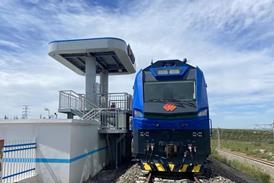Close menu
- Home
- News
- In depth
- Events
- Data
- Maps
- Tenders & Jobs
- Sponsored content
- Insights
Freight crisis is biting hard
By Railway Gazette International2009-06-01T05:00:00

EUROPE: Just how seriously the economic downturn is hurting Europe’s rail freight emerges from a Declaration issued at a joint CER-UIC High-Level Freight Meeting in Wien on April 24.
Already have an account? LOG IN
To continue…
You’ve reached your limit of content for the month
Get enhanced access to Railway Gazette news and weekly newsletters.
Site powered by Webvision Cloud














